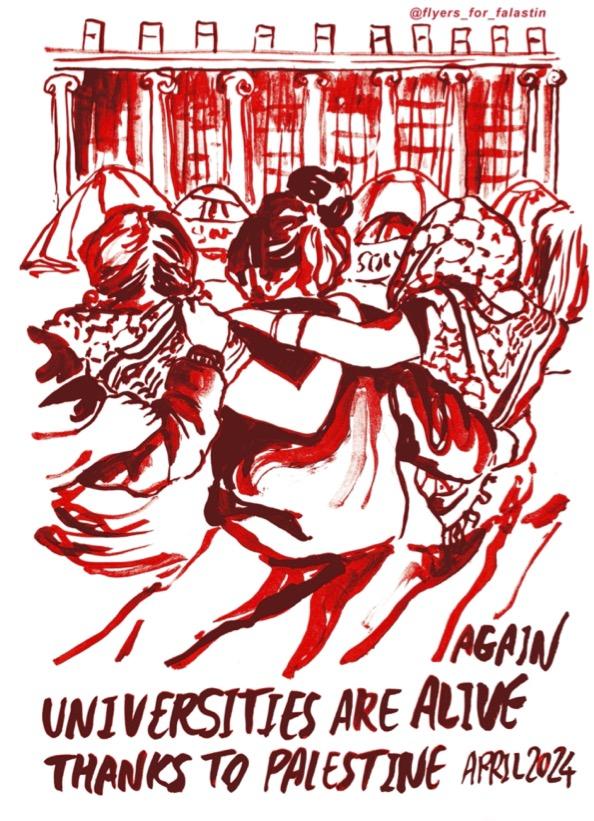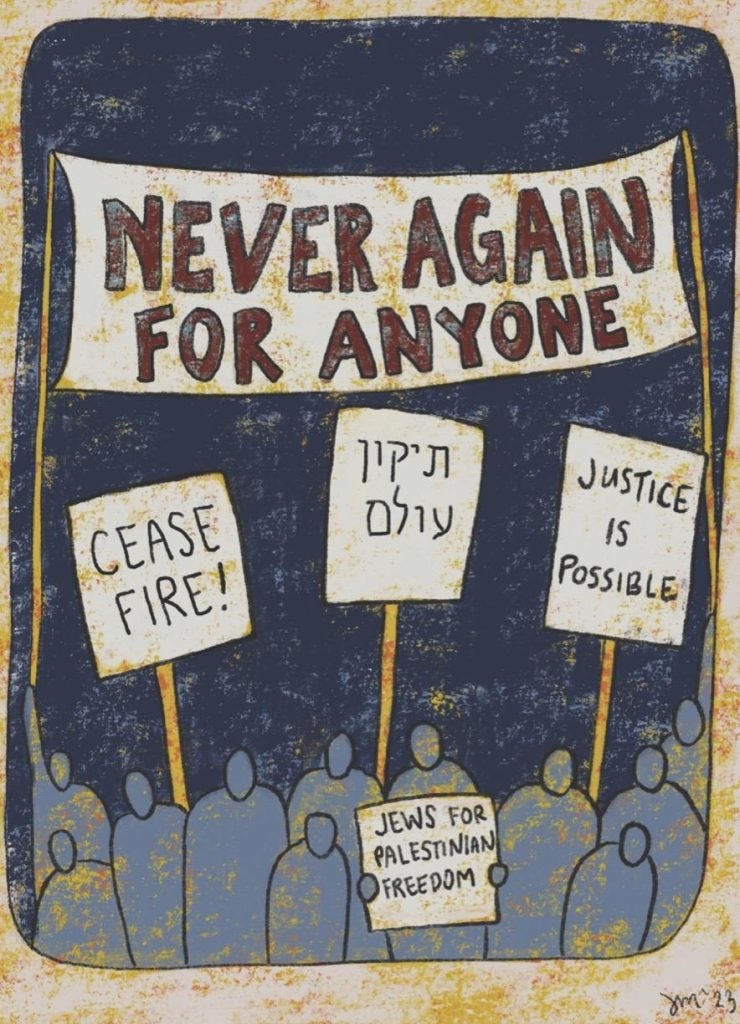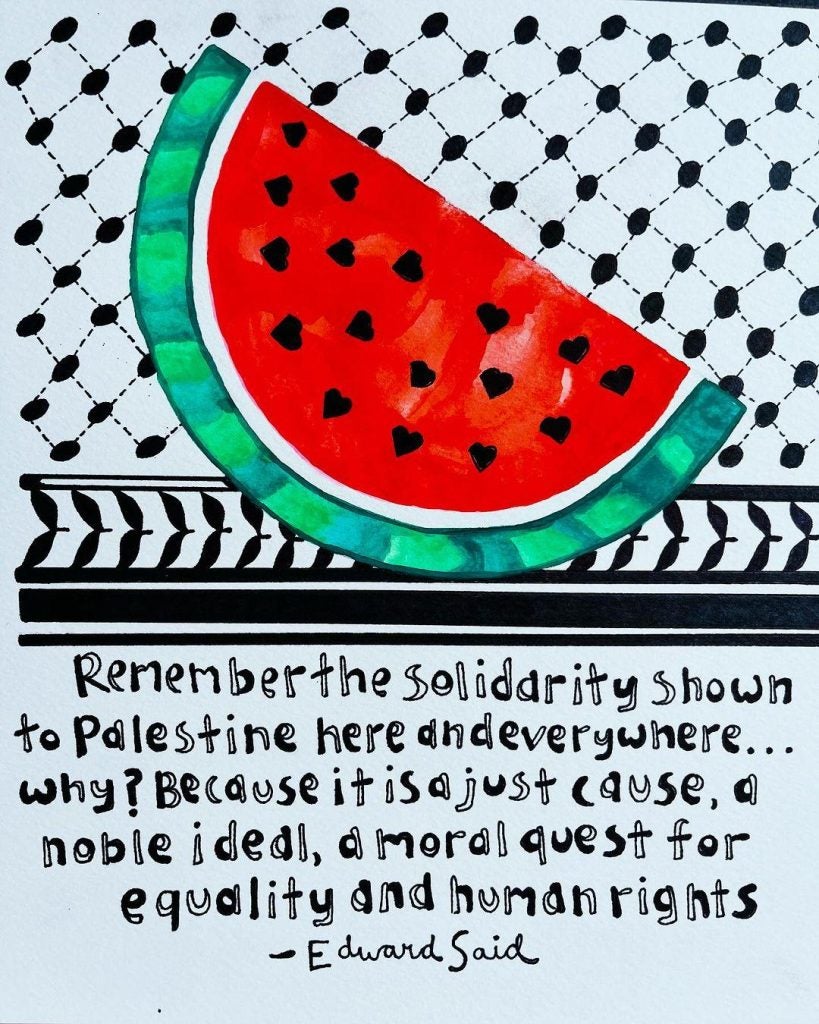
Professors Nader Hashemi, Jonathan Lincoln, and Fida Adely, each of whom direct academic centers within Georgetown’s School of Foreign Service, reflect on what it means to educate and care for students in this present moment.*
Crises provide educational opportunities
Dr. Nader Hashemi, Director of the Alwaleed Center for Muslim-Christian Understanding
The Israel-Gaza war has quickly morphed into a global crisis. It has produced deep polarization in the United States and its university and college campuses. As a professor and academic director who teaches Middle East studies, I have adopted a two-pronged approach to support students. First, I have tried to help students who are most impacted by this war. I know they are struggling and hurting. I have devoted extra office hours to meet with students and encouraged them to contact me to discuss any topic on their minds. Some students have accepted my offer, others have not. I have repeatedly let them know that my office door is always open. Secondly, as an educator, I have spent considerable time in my classes devoted to an open and uncensored discussion of the Oct. 7 crisis in Israel/Palestine. Students were eager to engage and discuss their views on this crisis. I felt I had a moral and pedagogical obligation to do this.
Today, there is a popular view among university and college administrators and some faculty that a key goal of a college education is to protect students from harm. My view is informed by an eloquent formulation from Van Jones, the prominent African-American public intellectual. He astutely observed that the goal of a college is to keep students “physically safe but intellectually unsafe, to force you to confront ideas that you vehemently disagree with.”
I have used this as my guide during this Middle East crisis. I have advised students on how to respond if they feel physically harassed or intimidated. Since Oct. 7, there has been a surge in reports of anti-Semitism and Islamophobia. I have counseled students on how to react in these contexts, including giving counsel on political discourse that can avoid the perception of bigotry. Specifically, I have encouraged students to adopt an international law framework when publicly debating the Israel/Palestine conflict.
More broadly, during moments of an international crisis, educators have a unique ethical responsibility to educate. I have understood this to mean that we need not less, but more public debate, discussion, and dialogue. The challenge is to do so constructively and with civility. This is especially needed in this moment, given the enormous human rights crisis in Gaza and the partisan role the United States has played in this drama. At SFS, we have organized a Gaza lecture series co-sponsored with several units on campus, and we have encouraged our dean to use his authority to organize public fora devoted to a critical and respectful engagement of this topic.
There is a tendency during moments like this to shy away from political controversy with the hopes that the crisis will pass, and calm can be restored on campus. My view is the exact opposite. Global crises are teaching moments. We have a moral obligation to seize these moments and to do what we were hired by the institution to pursue, to educate our students.

Listening can lead to understanding
Jonathan Lincoln, Interim Director of the Center for Jewish Civilization
The brutality of the Oct. 7 attack by Hamas on Israel and the subsequent war in Israel and Gaza have left many students and faculty in something akin to a state of shock. Although these events are happening far away from campus, many in our wider community, including students and faculty from Israel, have been directly affected—both personally and professionally. Students have reacted in a variety of ways. Some have turned to activism while others have retreated to safe spaces off campus. Some have found solace in one or more student groups, religious institutions, or academic communities.
Still, there is no single formula and our students have a wide range of experiences, opinions and connections to this conflict. Unfortunately, some have been less fortunate and found the prevailing atmosphere on campus stifling and even unwelcome, either to certain points of view or even for some merely seeking to understand the complexities of the debate. Along with our dedicated faculty, the Center for Jewish Civilization (CJC) has endeavored to respond by providing the necessary academic and social support to our students as they navigate these unprecedented times.
First and foremost, from an academic perspective, we have made space in the various courses we offer on the history and politics of the conflict to discuss and contemplate the ramifications of the war. We have also produced several events, often together with other academic centers and programs, for the broader university community to hear from our faculty and outside experts and engage in debate. Finally, we have set aside time each week to host a breakfast for students and faculty to meet, discuss issues and share thoughts and concerns related to life on campus, current events and other topics, all in a welcoming and judgment-free environment.
While students at the CJC come from diverse backgrounds, the acute rise in antisemitism across the country and in many parts of the world—something that predates the war—has also had a particularly worrying impact on the students we serve. Antisemitism extends far beyond Georgetown’s campus, but sadly our campus is not immune. We are thankful for the support the University has provided in addressing many of these concerns.
Overall, we are proud to be part of this academic community and identify strongly with the Jesuit commitment to holistic education. This is certainly a difficult period but as we hope and pray for a more peaceful future, we also reaffirm our shared commitment to our students and their wellbeing.
Supporting and being in solidarity with our students
Dr. Fida Adely, Director of the Center for Contemporary Arab Studies
These have been trying, painful, and bewildering times for many of the students I teach, advise, and encounter in my role as a professor of Arab Studies. Many are from the Arab world or have lived and worked there. Many felt dehumanized and ignored because of the way in which the events in Israel and Palestine were discussed in the United States. Others feared that they would become the victims of doxing, defamation, and even violence as they watched what was happening around the United States. While there has long been censorship and repercussions for those who critique the policies of the Israeli government, the level of censorship and harassment since October has been unprecedented and students needed help navigating this charged landscape.

In the first few weeks of this war, my colleagues and I held multiple informal gatherings to create a space to be with each other and to be able to speak freely about the violence that was unfolding. We also held many events with speakers who reflected on the contexts for the war, a longer history of occupation, siege and displacement, and the United State’s involvement in funding the Israeli military and its occupation. While many universities were censoring such conversations, we held many such events, and Georgetown has remained committed to protecting the spaces of critique and discussion that are so central to a university’s mission.
Some of my students have faced tremendous loss, with scores of family members killed in the Israeli war on Gaza. Others, not directly impacted, were nonetheless grieving. Sometimes what we needed to do is to grieve together—to acknowledge that nothing we say can ameliorate the tremendous violence and loss of life. Grieving means not being afraid to be vulnerable—showing emotion and attending vigils where the names of too many dead are read aloud. It also means giving hugs, feeding people, being understanding and flexible.
Some students are struggling to make sense of long held beliefs about international laws and conventions, about Israel, or about Arab governments. Again as both a teacher and mentor, my goal has been to create opportunities for students to speak freely about their misgivings, about what they don’t know or are not sure of, in the classroom, in small gatherings, and in one on one meetings.
What has been perhaps most important for me as a faculty member is to support my students through solidarity. By going to their walkouts, vigils and the teach-ins they organize, I try to support those students who speak up despite all the attempts to scare them into silence.
Also, by speaking up myself, I try to model a commitment to social justice that was cultivated in part through my education at an undergraduate Jesuit institution where I learned that we must labor against all forms of injustice. That to love others — to be men and women for others — demands that we act, that we do not remain silent.
*This article was first published by Conversations on Jesuit Higher Education on February 25, 2024 and then reprinted in the Fall 2023-Spring 2024 issue of the CCAS Newsmagazine.